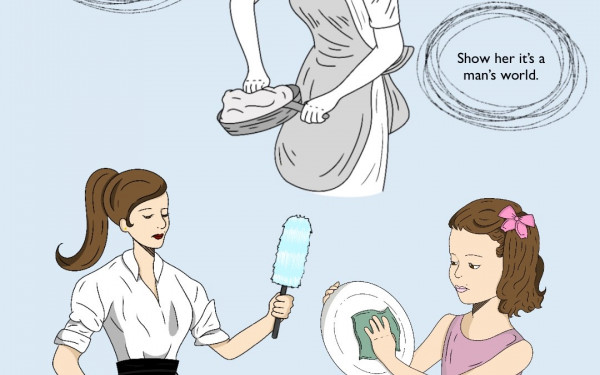Montreal Women’s March Takes Place to Fight for Intersectional Rights
Rally Takes Place a Year After Trump Inauguration
Hundreds of people holding hands chant Alicia Keys’ lyrics “I’m on fire, I am powerful” in solidarity, prompted by artist Barbara Chin.
On the anniversary of Trump’s inauguration, a crowd of about 300 people rallied at Place des Arts to stand for women’s rights.
In the crowd, a sign reading “Intersectionality or bullshit” can be spotted, following the theme of this year’s Women’s March in Montreal.
Groups like Stella, l’amie de Maimie, Black Lives Matter Montreal, the Fédération des femmes du Québec, and the Quebec Coalition of Sexual Assault Centres were all present. Speeches addressed the #metoo movement as well as the Indigenous women of Val-d’Or who never got justice after denouncing sexual violence by police.
“The feminist movement is alive, well, and important,” said executive director of Stella, l’amie de Maimie and board member of the FFQ, Sandra Wesley.
“The theme this year was to put forward the voices of marginalized women. It’s always a great opportunity to be able to hear from Black women, sex workers, from Indigenous women.”
Nathalie Provost, a survivor of the Polytechnique Massacre was there to tell her story to the crowd. She witnessed 14 women get murdered and was among the 14 wounded.
“We spoke of crazed actions, but not of political actions against women,” she said. “However, what I lived–without having it been a sexual assault–was clearly an assault based on sex.”
She recalls that 28 years ago, in front of Marc Lépine’s gun, she told him that she was not a feminist, despite believing in the ideology, in order to save her own life. She said that that day she understood that mentalities don’t change quickly, and that life certainly isn’t fair.
“We spoke of crazed actions, but not of political actions against women. However, what I lived–without having it been a sexual assault–was clearly an assault based on sex.”— Nathalie Provost
“Today it is my girls who walk with me and often, like you, in front of me. I form with you a line of women for whom everything is possible,” said Provost in her speech.
The rally was organized by volunteers, with the women from the Centre des femmes de l’UQAM taking initiative to get it started in order to join all the other major cities holding similar movements that day.
Protester Tamarack Verrall, who has been in the women’s movement for 50 years, said that she participates in these events in the hopes of seeing an end to the oppression of women globally.
“We can feel pretty alone sometimes,” she said. “To come here together today not only do we get to see that we are a large group, but we also show the world that we are standing together.”
She wants to see women’s connections with each other get stronger and their voices get louder “so that we have the kind of society that we are trying to bring into fruition, here and everywhere, and that everyone lives a safe life, that everyone has the chance to live her life the way she wants to.”
2_900_600_90.jpg)
Change always starts with a thought. From the thought, a feeling, and from the feeling, change, said Chin.
“[Events like these] are important, it’s very educational, it’s empowering, it gives people validation and esteem for what’s going on. It’s a healing event for many,” she said.
That being said, Wesley believes that holding rallies is not enough.
“[Events like these] are important because it’s a way to send a message out to the world, but these events are just one thing,” she said.
“The actual work is what we do year-round when we’re trying to change policies, when we’re educating people. This is one way to attract people and get the conversation started, but the important work is what we do the rest of the year. We hope to see people take actual actions.”

1_900_600_90.jpg)




_600_375_90_s_c1.jpg)